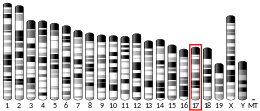CHTF18
Chromosome transmission fidelity protein 18 homolog is a protein that in humans is encoded by the CHTF18 gene.[5][6]
| CHTF18 | |||||||||||||||||||||||||
|---|---|---|---|---|---|---|---|---|---|---|---|---|---|---|---|---|---|---|---|---|---|---|---|---|---|
| Identifiers | |||||||||||||||||||||||||
| Aliases | CHTF18, C16orf41, C321D2.2, C321D2.3, C321D2.4, CHL12, Ctf18, RUVBL, chromosome transmission fidelity factor 18 | ||||||||||||||||||||||||
| External IDs | OMIM: 613201 MGI: 2384887 HomoloGene: 32532 GeneCards: CHTF18 | ||||||||||||||||||||||||
| |||||||||||||||||||||||||
| |||||||||||||||||||||||||
| |||||||||||||||||||||||||
| Orthologs | |||||||||||||||||||||||||
| Species | Human | Mouse | |||||||||||||||||||||||
| Entrez | |||||||||||||||||||||||||
| Ensembl | |||||||||||||||||||||||||
| UniProt | |||||||||||||||||||||||||
| RefSeq (mRNA) | |||||||||||||||||||||||||
| RefSeq (protein) | |||||||||||||||||||||||||
| Location (UCSC) | Chr 16: 0.79 – 0.8 Mb | Chr 17: 25.72 – 25.73 Mb | |||||||||||||||||||||||
| PubMed search | [3] | [4] | |||||||||||||||||||||||
| Wikidata | |||||||||||||||||||||||||
| |||||||||||||||||||||||||
Interactions
CHTF18 has been shown to interact with:
gollark: Since it allows you to nest ME networks inside it.
gollark: Technically, the one providing the most is Compact Machines.
gollark: Not with a storage bus, I mean, with a storage bus on interfaces on drives.
gollark: All my storage is set up that way for Reasons™.
gollark: That seems more complicated than using a single storage bus, but I guess that'd work.
References
- GRCh38: Ensembl release 89: ENSG00000127586 - Ensembl, May 2017
- GRCm38: Ensembl release 89: ENSMUSG00000019214 - Ensembl, May 2017
- "Human PubMed Reference:". National Center for Biotechnology Information, U.S. National Library of Medicine.
- "Mouse PubMed Reference:". National Center for Biotechnology Information, U.S. National Library of Medicine.
- Ohta S, Shiomi Y, Sugimoto K, Obuse C, Tsurimoto T (Oct 2002). "A proteomics approach to identify proliferating cell nuclear antigen (PCNA)-binding proteins in human cell lysates. Identification of the human CHL12/RFCs2-5 complex as a novel PCNA-binding protein". The Journal of Biological Chemistry. 277 (43): 40362–7. doi:10.1074/jbc.M206194200. PMID 12171929.
- "Entrez Gene: CHTF18 CTF18, chromosome transmission fidelity factor 18 homolog (S. cerevisiae)".
- Bermudez VP, Maniwa Y, Tappin I, Ozato K, Yokomori K, Hurwitz J (Sep 2003). "The alternative Ctf18-Dcc1-Ctf8-replication factor C complex required for sister chromatid cohesion loads proliferating cell nuclear antigen onto DNA". Proceedings of the National Academy of Sciences of the United States of America. 100 (18): 10237–42. doi:10.1073/pnas.1434308100. PMC 193545. PMID 12930902.
- Merkle CJ, Karnitz LM, Henry-Sánchez JT, Chen J (Aug 2003). "Cloning and characterization of hCTF18, hCTF8, and hDCC1. Human homologs of a Saccharomyces cerevisiae complex involved in sister chromatid cohesion establishment". The Journal of Biological Chemistry. 278 (32): 30051–6. doi:10.1074/jbc.M211591200. PMID 12766176.
External links
- Human CHTF18 genome location and CHTF18 gene details page in the UCSC Genome Browser.
Further reading
- Shiomi Y, Masutani C, Hanaoka F, Kimura H, Tsurimoto T (Jul 2007). "A second proliferating cell nuclear antigen loader complex, Ctf18-replication factor C, stimulates DNA polymerase eta activity". The Journal of Biological Chemistry. 282 (29): 20906–14. doi:10.1074/jbc.M610102200. PMID 17545166.
- Beausoleil SA, Jedrychowski M, Schwartz D, Elias JE, Villén J, Li J, Cohn MA, Cantley LC, Gygi SP (Aug 2004). "Large-scale characterization of HeLa cell nuclear phosphoproteins". Proceedings of the National Academy of Sciences of the United States of America. 101 (33): 12130–5. doi:10.1073/pnas.0404720101. PMC 514446. PMID 15302935.
- Bermudez VP, Maniwa Y, Tappin I, Ozato K, Yokomori K, Hurwitz J (Sep 2003). "The alternative Ctf18-Dcc1-Ctf8-replication factor C complex required for sister chromatid cohesion loads proliferating cell nuclear antigen onto DNA". Proceedings of the National Academy of Sciences of the United States of America. 100 (18): 10237–42. doi:10.1073/pnas.1434308100. PMC 193545. PMID 12930902.
- Merkle CJ, Karnitz LM, Henry-Sánchez JT, Chen J (Aug 2003). "Cloning and characterization of hCTF18, hCTF8, and hDCC1. Human homologs of a Saccharomyces cerevisiae complex involved in sister chromatid cohesion establishment". The Journal of Biological Chemistry. 278 (32): 30051–6. doi:10.1074/jbc.M211591200. PMID 12766176.
- Naiki T, Kondo T, Nakada D, Matsumoto K, Sugimoto K (Sep 2001). "Chl12 (Ctf18) forms a novel replication factor C-related complex and functions redundantly with Rad24 in the DNA replication checkpoint pathway". Molecular and Cellular Biology. 21 (17): 5838–45. doi:10.1128/MCB.21.17.5838-5845.2001. PMC 87303. PMID 11486023.
- Daniels RJ, Peden JF, Lloyd C, Horsley SW, Clark K, Tufarelli C, Kearney L, Buckle VJ, Doggett NA, Flint J, Higgs DR (Feb 2001). "Sequence, structure and pathology of the fully annotated terminal 2 Mb of the short arm of human chromosome 16". Human Molecular Genetics. 10 (4): 339–52. doi:10.1093/hmg/10.4.339. PMID 11157797.
This article is issued from Wikipedia. The text is licensed under Creative Commons - Attribution - Sharealike. Additional terms may apply for the media files.



